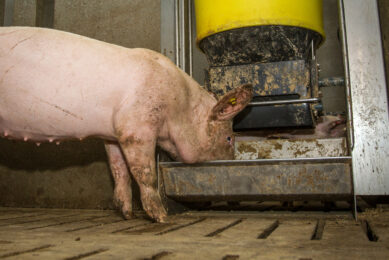Pellets versus meal
Despite numerous research studies and practical observation trials, the puzzle over ‘pellets versus meal’ remains confusing for most producers and their consultants. The reason lies behind the fact that results of using either form of feed remain largely farm-specific. Let me explain.
Despite numerous research studies and practical observation trials, the puzzle over ‘pellets versus meal’ remains confusing for most producers and their consultants. The reason lies behind the fact that results of using either form of feed remain largely farm-specific. Let me explain.
Invariably, pellets offer advantages in terms of palatability, increased nutrient density per unit of volume, reduced wastage, better flowability and in some cases improved nutrient digestibility.
Nevertheless, there is always a cost associated with producing pellets and this cost must be offset by an equal return on investment, which is easily translated as an improvement in feed efficiency.
Young pigs
Most experts would agree that young pigs, that is below 30 kg body weight, are the most likely to benefit from pelleted feed. The expected improvement in feed efficiency in this case is between 5 and 10%.
Crowded piglets appear to benefit most from pelleted feed as feed competition in the feeder is partially offset by a quicker or larger meal.
Growing-finishing pigs
In contrast, growing-finishing pigs rarely benefit directly from pelleted feed and the improvement in feed efficiency is usually below 5%.
In this case, the increase in feed cost should not exceed the increase in feed efficiency, for pelleting to be a profitable application.
Sows
For sows, the only case pelleted feed is recommended is when lactating sows fail to consume a sufficient amount of feed to produce piglets of acceptable body weight at weaning.
In this case, an increase of 10% in feed intake and feed efficiency is not unexpected, but again this tends to be very farm-specific.
Weaned piglets
So, where is the confusion regarding the issue of pellets versus meal? It is in weaned piglets. Research has shown that weaned piglets consume more feed (as much as 15% more) when they are offered pellets.
But, practical observations indicate that in certain cases piglets offered a meal diet either start eating faster or scour less. So, what is happening?
Easier to consume
I believe that in the first case, the meal diet is easier to consume if you compare it to pellets. Pellets are really hard and thus it depresses feed intake as weaned pigs have a hard time chewing them.
Research has clearly demonstrated that very young pigs prefer a meal diet over a hard pellet.
Also, in pelleted diets aromas tend to disappear faster and thus, any effect such additives might have are stronger in meal diets.
Last, but not least, is the fact that piglet diets in meal are sticky and thus, they tend to stick on pig noses as they explore their environment in the first hours post-weaning. This forces the piglets to lick the feed off, which in turn helps them recognize it as a form of nourishment!
Incidence of scours
The issue regarding the increased incidence of scours in pigs offered pelleted diets is more serious and deserves increased attention.
First, it is true that meal diets support a less fluid digesta, which precludes secretory diarrhoea.
Also, with meal diets an indirect feed restriction is imposed as piglets tend to eat less of a meal diet (that is, compared to a properly manufactured pellet). Thus, less indigestible material reaches the hindgut to promote proliferation of harmful bacteria. In my opinion, piglets prone to diarrhoeas should not be offered pelleted diets, at least immediately after weaning.
Variable response
So, to recap, pelleting is a beneficial form of feed processing, but pigs respond quite variably to it, and thus the decision to use this application must be based on actual farm observations.
Animals most likely to benefit from pelleting are lactating sows and young piglets. However, the latter might actually benefit more from a meal diet if they suffer from post-weaning scours.











